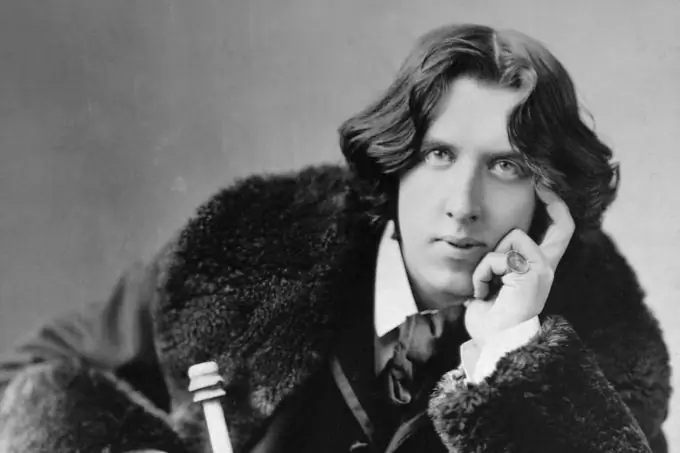- Author Antonio Harrison harrison@cultureoeuvre.com.
- Public 2023-12-16 07:44.
- Last modified 2025-01-22 21:44.
The Irish playwright and prose writer Oscar Wilde created the classic work of the 19th century - "The Picture of Dorian Gray", perceived by many generations as a literary masterpiece. However, this talented writer died in poverty and loneliness at the age of 46.

Childhood and youth
Oscar Wilde was born in 1854 in the capital of Ireland, the son of a medical father, knighted, and a mother who, during her lifetime, was one of the most prominent representatives of the struggle for the rights and freedom of women. Both parents were part of an elite secular society, and both were seriously interested in literature. My father wrote prose, my mother studied poetry. Oscar Wilde had an older brother and a younger sister who, unfortunately, died at the age of ten.
Wealthy parents gave their children the best. This also applied to education. In early childhood, even before entering school, the best teachers and governesses were invited to the house. Whether inheritance played a role, or such a reverent attitude towards learning, Oscar Wilde really did make great progress in his studies. In 1874 he began to study classical literature and philosophy at Oxford University.
Wilde creates his first poetic works in Oxford. There he writes "Ravenna", for which he receives many approvals and recognition. In addition, during his university years, Wilde's unique style and manners, his love for ethics and morality, extreme wit and self-irony were formed. Many began to admire and imitate the young genius. His words were broken into quotations.
From his youth, the young poet was distinguished by his excessive amorousness. He visited brothels in the capital, which at that time was considered normal even in secular society. But at the age of 30, Wilde marries a wealthy woman from England - Constance Lloyd, and they have two sons. The birth of children became an inspiration for him to write fairy tales.
The most fruitful episode in the life of the prose writer began in 1887. He wrote an important work for his career, "The Canterville Ghost", and by 1890 finished the autobiographical novel "The Picture of Dorian Gray", which was frowned upon by critics for lack of morality. But the literary masterpiece has become extremely popular among the general public and has been filmed about 20 times. After the publication of the novel, Wilde has been writing plays for theatrical performances.
Court case
Despite his morality and the image of an ideal young man, Oscar Wilde managed to defame him, ruining his career and his whole life. For some reason, the relationship with his wife did not go well, and the couple began to live separately. In 1891, the playwright meets a young boy, Alfred Douglas, and enters into a long-term intimate relationship with him. Alfred's father finds out about this and accuses Wilde of homosexuality, for which the writer sues him. But numerous testimonies, including intimate letters and testimony from Douglas, give the Irish novelist 2 years in prison and hard labor for rude and indecent behavior.
After his release from prison, Oscar Wilde lost his fame and authority. He practically did not write, he lived like a beggar, asked for help from relatives and friends. The most famous work during this period of his life was the work about his prison years - "The Ballad of the Reading Prison". The writer died of meningitis in 1900 in Paris.






